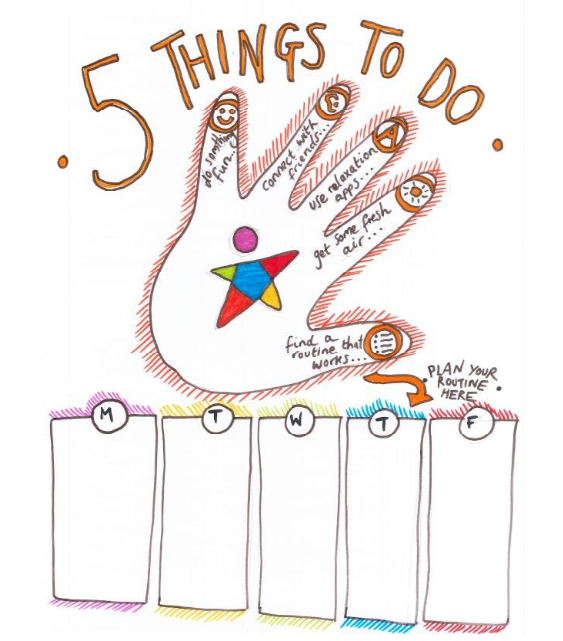Next week is Mental Health Awareness Week. You will have received this letter as a parent, with resources from Karen Moore:
This year’s theme from the Mental Health Foundation is ‘Kindness’. The Mental Health Foundation would like us to celebrate the many acts of kindness that are important to our mental health and wellbeing. The challenge is to try to show kindness to another person throughout the week, and attached is the St Johns Ambulance Kindness Calendar that can be used to help with this.
Some ideas for random acts of kindness to others could be:-
- Call a friend that you haven’t spoken to for a while
- Tell a family member how much you love and appreciate them
- Make a cup of tea for someone you live with
- Arrange to have a cup of tea and virtual catch up with someone you know
- Help with a household chore at home
- Arrange to watch a film at the same time as a friend and video call
- Tell someone you know that you are proud of them
- Tell someone you know why you are thankful for them
- Send a motivational text to a friend who is struggling
- Send someone you know a joke to cheer them up
- Send someone you know a picture of a cute animal
- Send an inspirational quote to a friend
- Send an interesting article to a friend
- Contact someone you haven’t seen in a while and arrange a phone catch up
- Spend time playing with your pet
- Reach out to call a friend, family member or neighbour who is experiencing loneliness or self-isolation
- Donate to a charity
- Lend your ear – call a colleague and ask how they’re finding the change in routine
- Give praise to your colleague for something they’ve done well
- Arrange to have a video lunch with a colleague
- Send an inspirational story of kindness people around the world are doing for others to someone you know
- Donate to foodbanks
- Offer to skill share with a friend via video call – you could teach guitar, dance etc.
- Offer support to vulnerable neighbours.
Not only is the challenge about being kind to others but also, in these difficult times, it is about being kind to yourself. The suggestion is that we take some time out of each day for ourselves, by being active for 30 minutes whatever your physical ability. This could include baking, walking, cycling, yoga, gardening or even dancing around the kitchen!
Below is a list of ideas and tips that can help to look after adults and children’s mental health, while having to stay at home :-
- Stay in touch with others using different methods than usual, such as phone, email, WhatsApp and Facetime. These are ways of being close to the people that we care about.
- Create a new daily routine, keeping meal and bedtimes consistent.
- Limit exposure to the news and avoid social media speculation, which can fuel any anxiety or worries. Equip yourself with information from trusted sources.
- Eat well. Cooking can help detract from negative thoughts about the current situation and can help you to eat well. Children can be included and share the task.
- Sleep well. This can be difficult when there is a change in our daily routine or we are feeling overwhelmed by uncertainty. Sleep helps our bodies to heal and recover and a lack of it can make us feel physically unwell and stressed. Regular exercise can help (but 3 hours before bed) as well as creating a restful environment, avoiding caffeine close to bedtime and having a relaxing bedtime routine that lets you unwind, which may include reading or listening to music. Sleep and wake times should aim to be the same each day. Worries can often pop into our head when it’s time to sleep and keep us awake, so writing them down as a list to do the next day can help to clear your mind.
- Both children and adults can become worried about Coronavirus, so chatting through your fears with someone you trust may support you with this. For children facts should be explained in age appropriate language. If they are constantly asking questions or are worried, set aside some time each day to discuss what is on their mind.
- Distract yourself by doing things that you enjoy and encourage children to do the same.
- Take time to reflect on what went well during the day and what you are grateful for, no matter how small. Children can be involved in this process too.
- Try to manage difficult feelings by focusing on things you can control, including where to get information from and anything you can do to help yourself feel better prepared.
- Set a goal for the day. Achieving it will help give a sense of control and purpose. It could be reading, playing a game or watching a film.
- Keep your mind active by drawing, painting or completing puzzles etc.
Here are some resources that you may find useful for children to complete:
This Is Me – To complete with your child about what you have been doing recently.
Things to Do – A plan to show 5 things you would like to do each day.
Feelings Tracker – A record of how your child feels each day, which could then be talked through with them.
Twinkle kindness activities – Acts of kindness that your child might like to do.
Take care and stay safe.
Karen Moore
Pastoral Leader

